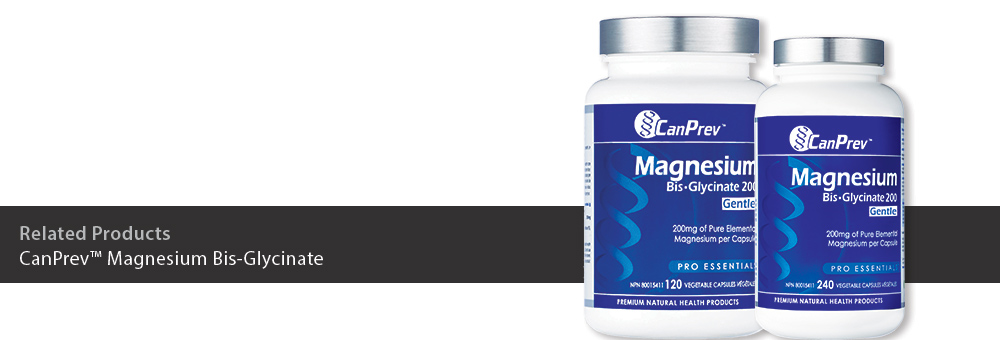

Choosing the magnesium that’s right for you
It’s suspected that over 43% of Canadians don’t get the dietary magnesium they need to stay healthy. A deficiency of this multi-tasking mineral can be problematic because it plays a critical role in more than 350 biochemical reactions. This mineral isn’t a drug we take only when the situation warrants. It’s more like a type of fuel or building block our body uses, just as our body uses sugars, proteins and fats. Vital organs like the heart and brain simply can’t function without it. Hundreds of your body’s chemical processes fall apart without this mineral. When we say our whole body needs magnesium, we are not exaggerating.
- Harder to find in food. Even traditionally magnesium-rich foods like leafy green vegetables and whole grains may not be good sources of magnesium. Why? They are grown in nutrient-depleted soil, thanks to modern agricultural practices. Processed foods have even less. For example, further refining can remove up to 97% of magnesium from foods like breads and pasta.
- Harder to absorb. Whether it’s phosphates in soda or gastrointestinal conditions like IBS, many facets of our lives can impair the absorption of the magnesium we DO get. Drug-induced nutrient depletion is also widespread. Diuretic anti-hypertensives and mineral-binding antibiotics can block magnesium before your gut even has a chance to absorb it.
- Easier to lose. Modern life causes our bodies to expend and excrete more magnesium. For instance, when we’re stressed, magnesium is expended to produce cortisol. Also, alcohol consumption and blood sugar sensitivity may cause our kidneys to eliminate more magnesium.
Absorbing Magnesium
The magnesium we absorb is never pure magnesium. Magnesium ions (Mg2+) are highly reactive and unstable on their own. They are positively charged ions and like to form compounds with other substances. When they bind with negatively charged molecules (anions) they form salts. When they bind specifically with amino acids, we call them amino acid complexes.
Why Choose Chelates?
Magnesium salts are split back into magnesium ions when they hit the acidic environment in the stomach. Magnesium amino acid complexes (or chelates) behave differently from magnesium salts. The strong and stable bonds between magnesium and the amino acids keep the whole molecule intact in acidic environments. When these complexes travel through the intestinal tract, they use transport sites called dipeptide channels. Here, the amino acid and magnesium are carried across the intestinal membrane together. There are a few key advantages to this. For one, there are far more dipeptide channels than there are ion channels in the gut. Magnesium complexes do not compete for the same ion channels used by other minerals. Another advantage is that the stable bonds protect magnesium from unfavourable chemical reactions that might lead to the creation of unabsorbable precipitates. Mineral amino acid complexes are actually quite common in nature and a natural way we get magnesium from our diet. Some of this magnesium is already bound to amino acids, but even when we consume magnesium from salts, amino acids can help!
The Kicker
Ironically, magnesium needs magnesium to facilitate the absorption process. It’s imperative for helping to synthesize enzymes, repair tissue in our intestinal lining, and contribute to our parasympathetic nervous system health, for starters. In order for these processes to function properly in the first place, we need to have enough magnesium in our bodies to provide energy to get these physiological jobs done and done well.
Which CanPrev optimized magnesium bis-glycinate to choose?
Effective supplementing of magnesium depends on two factors: how much you consume and how much your body can absorb. How much you can absorb depends on your lifestyle, your diet, stress levels, medications you may be taking and age. For most individuals, the Gentle formula will provide an effective dose that is gentle and absorbable. For individuals who are chronically stressed, older, have weak stomach acid, or may be taking prescription medications, the Extra Gentle or Ultra Gentle will provide better absorption.
Gentle: This unique magnesium-glycine complex provides a therapeutic 200mg of pure, elemental magnesium with every vegetable capsule. A fair balance of potency, gentleness and absorption, this magnesium bis-glycinate is great for most cases. It combines pre-formed magnesium bis-glycinate chelate, along with its precursors, magnesium oxide and glycine. Over 50% of the capsule contents by weight is glycine. In the stomach (an acidic environment) the oxide breaks away from the magnesium and the free glycine bonds with the magnesium ion to form magnesium bis-glycinate. Ideal for most people with active lifestyles
Extra Gentle: Designed for those seeking potency with enhanced gentleness, this Magnesium Bis-Glycinate delivers more glycine to ensure magnesium absorption in spite of digestive issues. It provides a higher proportion of preformed magnesium bis-glycinate chelate than the Gentle formula. Recommended for those with sensitive digestion, IBS or weak stomach acid. Ideal for sensitive stomachs 55 years or older.
Ultra Gentle: Designed for those seeking magnesium with maximum gentleness. This form provides the most glycine, with no oxide content, to ensure gentle absorption and resistance to insoluble substances. Recommended for those with multiple prescriptions or digestive conditions like Crohn’s and colitis. Ideal for digestive issues or if you’re taking medication.
To read more on magnesium bis-glycinate absorption you can visit: magnesium.ca.

